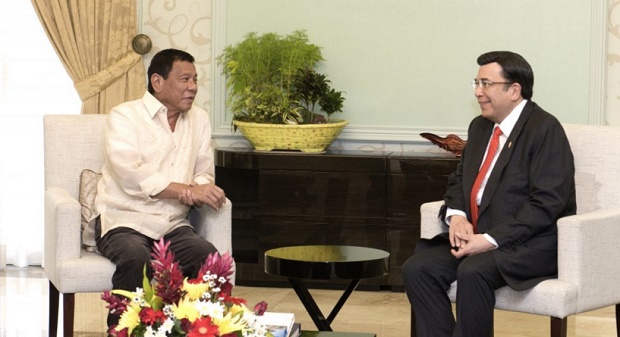
The presidential palace has defended the decision to name the executive minister of Iglesia Ni Cristo as special envoy for overseas Filipinos.
A Malacañang spokesman has denied concerns that appointing Eduardo Manalo was a “political accommodation” or a violation of constitutional provisions on the separation of church and state.
Presidential spokesman Harry Roque said Manalo was appointed to the government post due to his “established network” in providing assistance to Filipinos abroad.
As the president’s special envoy, Manalo is expected to help protect the welfare of overseas Filipino workers (OFWs) without getting any salary from the government, he added.
“This is not political payment,” he said during a Palace news conference, in response to accusations that Manalo was handed the post after the INC backed Duterte in the 2016 elections.
“There is the urgency to provide additional assistance to our OFWs and that urgency can be filled in through the appointment of Mr Manalo.”
He also said that Manalo’s appointment was not a violation of the principle of separation of church and state.
“There are two elements regarding the separation of church and state: the freedom to choose your own religion and the certainty that the government will not impose only one religion,” he said.
Roque also said the government wanted to employ Manalo not only for his vast overseas network but also his long history of service to Filipinos regardless, of religious affiliation.
“They have an established network and they have projects that benefited our OFWs. Their services are not only meant for the members of their religious group but for all Filipinos,” he said.
“That’s what we want to tap — the network and the proven ability of their organisation on taking care of the welfare of our countrymen in different countries.”
According to the president’s appointment paper, dated February 13, Manalo’s term started on January 30 and is due to run until January 29 next year.
Roque said Manalo would not be paid for his work and would not receive any budget allocation.
“Well, What I know is that we don’t have any budget allocated for special envoys. That’s the truth. We will benefit from his network and we won’t be paying him for his work,” he said.
“With his appointment amid the abuses of our countrymen in Kuwait, he is expected to step-up his service towards our OFWs.”

Comments are closed.